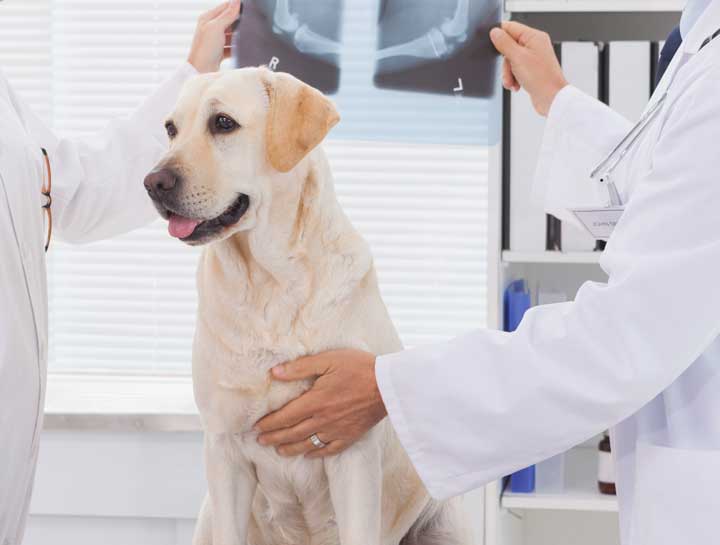Musculosketal System
Muscles, bones, and joints in the body, including the tendons and ligaments that connect them.
The musculoskeletal system is comprised of all of the muscles, bones, and joints in the body, including the tendons and ligaments that connect them. Disorders involving this body system are a common reason why a pet is presented to Polo Springs Veterinary Hospital for an evaluation. We see pets for limping, weakness, difficulty or slowness in walking and/or rising, generalized joint pain and/or swelling, traumatic injuries such as sprains, tears, and fractures, and muscle and bone cancers. The first step we take in helping your pet is to ask you a series of detailed questions related to their mobility problem, while subsequently performing a thorough and complete physical examination of them. The information gathered during our assessment of your pet will help us decide whether diagnostic testing is necessary. While radiographs (x-rays) are a common test utilized for many orthopedic (musculoskeletal) problems, you might be surprised to learn that parasites, bacteria, viruses, and even organ malfunction, immune system attack, or hormone imbalance may be to blame for your pet’s problem. Since our animal companions are unable to verbally communicate with us, detailed questions and thorough physical examination are critical to our assessment of your pet. Once the history is obtained and an examination is performed, we will take whatever time is necessary to educate you on your pet’s condition and formulate a diagnostic and/or treatment plan in order to best help them recover. In the event that radiographs are taken of your pet, our board-certified veterinary radiologist will promptly evaluate your pet’s images when necessary.
We also see a variety of congenital or developmental problems in young growing animals. Hip dysplasia is a term many pet owners are familiar with, but did you know that it results from problems originating in puppyhood? If a puppy’s hip joints do not develop properly, they may experience a brief period of lameness (or limping) around 5 months of age. Typically the signs will resolve within a few weeks. Then, when the pet reaches middle age, arthritis develops in the malformed joints. Interestingly, certain cat breeds may develop congenital hip dysplasia. With arthritis (whether as a result of hip dysplasia or any other cause) the pet owner may witness signs such as limping, stiffness upon rising, difficulty with stairs, or trouble jumping on furniture or into cars. Frequently, pet owners who notice these symptoms simply think their pets are aging or slowing down a bit when in truth they are experiencing pain. Any time a pet is limping or not using a limb properly, it is because they are in pain. Some pets may only display a decreased appetite when they are experiencing pain, and some owners may not witness anything at all, as many pets (especially cats) are good at hiding their discomfort. Musculoskeletal pain is not only limited to pets with arthritis. Many different orthopedic problems may cause your pet to experience pain.
Other common musculoskeletal conditions involve soft tissue injuries. These can include muscle strains, torn ligaments (especially in the knee), and tendon problems. Of course, bones can be broken (fractures) or develop tumors. Less common musculoskeletal conditions can be autoimmune in nature (the body attacking its own muscles or joints), infection-related, or the result of an endocrine (hormonal) problem. Because orthopedic problems may have a multitude of causes, a thorough and detailed physical examination is critical to correct diagnosis and disease management.
Fortunately, Polo Springs Veterinary Hospital has numerous treatment options available to help your companion. Depending on the cause of your pet’s orthopedic problem, it may require surgery, rehabilitation, medication, and/or dietary therapy. Frequently, with orthopedic problems, medication is necessary to relieve the inflammation and discomfort that our patients are experiencing. In order to provide your pet with safe and immediate pain control, we stock our pharmacy with the newest and most advanced veterinary-approved medical therapy. Additionally, we also stock pure and patented veterinary nutritional supplements that have been scientifically proven to relieve chronic pain and inflammation, as well as slow the progression of further arthritic changes in our patients’ joints. We also frequently utilize a variety of injectable medical options to help manage our patients’ acute and chronic pain, as well as carry a variety of prescription/therapeutic diets designed to support healthy joints in our pets. Unfortunately, many dogs and cats with arthritis are also overweight, and the extra weight they are carrying will cause the arthritic changes in their joints to progress at a faster weight. Weight loss is especially critical in these pets. The veterinarians at Polo Springs are committed to helping these patients successfully get their weight under control through the use of an individually tailored program, along with a special prescription diet. Our board-certified veterinary nutritionist is also available for pets that may need additional help.
Polo Springs Veterinary Hospital also offers certification radiographs for the Orthopedic Foundation for Animals (OFA). Once a patient is 24 months of age, they are eligible for certification. Radiographs of the joints of interest are taken and subsequently submitted to the OFA for grading. This information is extremely helpful to breeders.
Our highly trained veterinarians have the skills, knowledge, and experience to help diagnose and treat the orthopedic problem that is plaguing your companion. Once we have made a diagnosis of your pet’s condition, we will formulate a treatment plan that will get your pet on the road to recovery, so they’ll feel good once again.
Call us at (719) 249-5835 today to schedule an appointment for your cat or dog.

